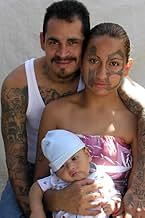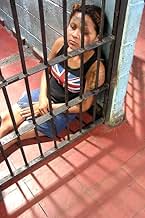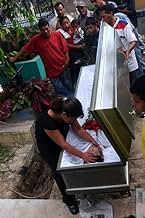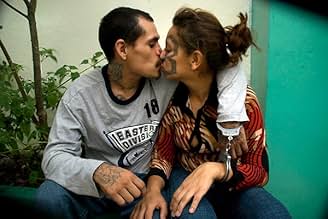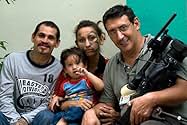Agrega una trama en tu idioma"La Vida Loca" reflects a depressing and hopeless reality. The documentary, by photojournalist and filmmaker Christian Poveda, follows some of the members of "la dieciocho", the so-called 18... Leer todo"La Vida Loca" reflects a depressing and hopeless reality. The documentary, by photojournalist and filmmaker Christian Poveda, follows some of the members of "la dieciocho", the so-called 18th Street gang in a poor San Salvador neighborhood."La Vida Loca" reflects a depressing and hopeless reality. The documentary, by photojournalist and filmmaker Christian Poveda, follows some of the members of "la dieciocho", the so-called 18th Street gang in a poor San Salvador neighborhood.
- Premios
- 2 nominaciones en total
Argumento
Opinión destacada
In stark contrast to the tranquility of the little painted houses in a tree-lined suburban housing estate in El Salvador, a violent gang culture permanently kills, maims or has jailed the young of the community. With a rate of 9 murders a day amongst the young, the country is caught in a massive gang feud. The gangs, and the feud, originate from the 1980s run- down south central Los Angeles. The problem could have been contained, considers Poveda, were it not that in 1996, the US government (under Clinton) decided to send 100,000 convicted gang members from US prisons to central America. Combined with a foreign policy of supporting dictatorships and financing civil wars, the scene has been set for human tragedy.
The fearless photographer and documentary-maker Christian Poveda submerges himself into central America a decade later, into the underbelly of society. He managed to get permission from the Salvadorian police and one of the gangs, the "18", to follow them in their lives. Four years later, La Vida Loca sees the light, taking you along the path of violent outcasts of society. And it is very different to what you might imagine.
The documentary takes us from the unfolding of someone's life to their funeral after a shooting. It is an endless spiral of gang violence, with seemingly no point to the gang war whatsoever, other than that of having an enemy to unite them. Joining a gang is not even an alternative employer for the poor, as the gang does not offer any external symbols of success (wealth, privilege, whatever). In fact, the gang does not seem to offer anything at all but the prospect of death, jail or invalidity. Hardly the attractive option, but these youths are already broken by their lives. And change becomes inevitable with the gang tattoos (voluntary or forced) marking their allegiance. Once you are have your face covered in tattoos, you can no longer send your CV anywhere. They can not back down.
The film lets the youths talk for themselves. They talk about their broken pasts, of growing up without the guiding support of a family. They speak of the love they get from the gang. They talk, with a peculiar detachment, of passing from one social service (juvenile detention) to another (jail), exposing an existential loneliness at the impoverished fringe in which they live. The gang might not offer the flash of fast cars, bikinis and swimming pools, but it does offer loyalty, stability and a shared suffering. The love of the gang is a love which fills an emotional void, giving them a sense of belonging amongst their peers. The gang is so much an end in itself that its members do not even fear death for it, but rather they expect it. The gang is not the path to wealth, status or happiness but rather a goal in itself. An end. But their fearlessness does not come from a feeling of superiority, what you might expect, but rather from an all-round stunted emotional development born out of their misery. They are phlegmatic, almost accepting their fate as a given. And hence they can tattoo themselves, as a confirmation of their fate, as whatever should befall them would befall them anyway.
But some do try. Christian Poveda follows a re-insertion program, where ex-gang members try to set up a bakery. We see them, the tattoo-ed ex-bullies, kneading the dough, we know they are serious about doing the right thing, of trying to improve their lives despite expectations. We see them pray, and talk with priests, but it is as if the words just float over their heads. When push comes to shove, who knows what they will do.
As tragic as the lives of the gang members are, as surprising it is to see that there is a normal society outside the walls of their lives. When they get hurt, they find themselves in a capable hospital, with all health services paid for by the state. When they find themselves in court, they are confronted with seemingly capable legal actors. When they are confronted with the police, they seem professional and organized. You might expect the gangsters to be aggressive ego-tripping characters, perhaps even with dubious contacts in the judiciary, but they are not like that at all. At least, they are not presented that way. When they are stopped by the police, they let themselves be searched or taken. When in court, they hear the court's verdicts stoically, accepting their fate as givens. Of course it is that same stoicism which makes them untouchable, even from punishment. Everything is pointless.
Seeing the film today, so shortly after director Christian Poveda was shot dead in El Salvador, makes the film all the more moving. It is a unique chance to meet people you will never meet, and hear words you will never hear spoken. A look into a violent, criminal subculture normally hidden from view. A testament to a culture which so badly needs understanding, to, hopefully, one day rest in the past. (incitatus.org)
The fearless photographer and documentary-maker Christian Poveda submerges himself into central America a decade later, into the underbelly of society. He managed to get permission from the Salvadorian police and one of the gangs, the "18", to follow them in their lives. Four years later, La Vida Loca sees the light, taking you along the path of violent outcasts of society. And it is very different to what you might imagine.
The documentary takes us from the unfolding of someone's life to their funeral after a shooting. It is an endless spiral of gang violence, with seemingly no point to the gang war whatsoever, other than that of having an enemy to unite them. Joining a gang is not even an alternative employer for the poor, as the gang does not offer any external symbols of success (wealth, privilege, whatever). In fact, the gang does not seem to offer anything at all but the prospect of death, jail or invalidity. Hardly the attractive option, but these youths are already broken by their lives. And change becomes inevitable with the gang tattoos (voluntary or forced) marking their allegiance. Once you are have your face covered in tattoos, you can no longer send your CV anywhere. They can not back down.
The film lets the youths talk for themselves. They talk about their broken pasts, of growing up without the guiding support of a family. They speak of the love they get from the gang. They talk, with a peculiar detachment, of passing from one social service (juvenile detention) to another (jail), exposing an existential loneliness at the impoverished fringe in which they live. The gang might not offer the flash of fast cars, bikinis and swimming pools, but it does offer loyalty, stability and a shared suffering. The love of the gang is a love which fills an emotional void, giving them a sense of belonging amongst their peers. The gang is so much an end in itself that its members do not even fear death for it, but rather they expect it. The gang is not the path to wealth, status or happiness but rather a goal in itself. An end. But their fearlessness does not come from a feeling of superiority, what you might expect, but rather from an all-round stunted emotional development born out of their misery. They are phlegmatic, almost accepting their fate as a given. And hence they can tattoo themselves, as a confirmation of their fate, as whatever should befall them would befall them anyway.
But some do try. Christian Poveda follows a re-insertion program, where ex-gang members try to set up a bakery. We see them, the tattoo-ed ex-bullies, kneading the dough, we know they are serious about doing the right thing, of trying to improve their lives despite expectations. We see them pray, and talk with priests, but it is as if the words just float over their heads. When push comes to shove, who knows what they will do.
As tragic as the lives of the gang members are, as surprising it is to see that there is a normal society outside the walls of their lives. When they get hurt, they find themselves in a capable hospital, with all health services paid for by the state. When they find themselves in court, they are confronted with seemingly capable legal actors. When they are confronted with the police, they seem professional and organized. You might expect the gangsters to be aggressive ego-tripping characters, perhaps even with dubious contacts in the judiciary, but they are not like that at all. At least, they are not presented that way. When they are stopped by the police, they let themselves be searched or taken. When in court, they hear the court's verdicts stoically, accepting their fate as givens. Of course it is that same stoicism which makes them untouchable, even from punishment. Everything is pointless.
Seeing the film today, so shortly after director Christian Poveda was shot dead in El Salvador, makes the film all the more moving. It is a unique chance to meet people you will never meet, and hear words you will never hear spoken. A look into a violent, criminal subculture normally hidden from view. A testament to a culture which so badly needs understanding, to, hopefully, one day rest in the past. (incitatus.org)
- incitatus-org
- 12 oct 2009
- Enlace permanente
Selecciones populares
Inicia sesión para calificar y agrega a la lista de videos para obtener recomendaciones personalizadas
- How long is La Vida Loca?Con tecnología de Alexa
Detalles
- Fecha de lanzamiento
- Países de origen
- Sitio oficial
- Idioma
- También se conoce como
- La Vida Loca
- Locaciones de filmación
- Productoras
- Ver más créditos de la compañía en IMDbPro
Taquilla
- Total a nivel mundial
- USD 63,756
Contribuir a esta página
Sugiere una edición o agrega el contenido que falta

Principales brechas de datos
What is the English language plot outline for La vida loca (2008)?
Responda
